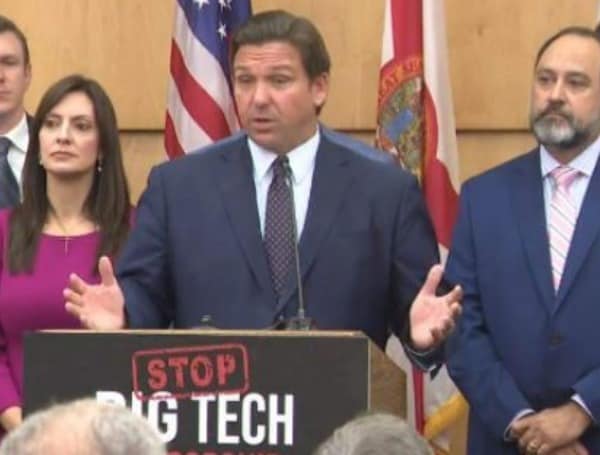Florida Gov. Ron DeSantis (TFP File Photo) Arguing that parts of the law violate the First Amendment, the Biden administration Monday urged the U.
Arguing that parts of the law violate the First Amendment, the Biden administration Monday urged the U.S. Supreme Court to take up a challenge to a 2021 Florida law that placed restrictions on major social-media companies.
U.S. Solicitor General Elizabeth Prelogar and other Department of Justice attorneys filed a 25-page brief that said the Supreme Court should hear arguments about the Florida law and a similar Texas law. The brief also said justices should uphold an 11th U.S. Circuit Court of Appeals ruling that blocked parts of the Florida law.
The industry groups NetChoice and the Computer & Communications Industry Association challenged the constitutionality of the Florida law, which placed restrictions on large social-media companies such as Facebook and Twitter, now known as X.
In the news: Florida Gov. DeSantis: State Has Moved On Amid Disney Fight
Gov. Ron DeSantis made a priority of the issue after Twitter and Facebook blocked former President Donald Trump from their platforms after Trump supporters stormed the U.S. Capitol on Jan. 6, 2021.
U.S. District Judge Robert Hinkle issued a preliminary injunction against the measure, describing it as “riddled with imprecision and ambiguity.” The 11th U.S. Circuit Court of Appeals last year upheld much of the preliminary injunction, though it said parts of the law could take effect.
In Monday’s brief, the Justice Department attorneys argued the Supreme Court should weigh the constitutionality of part of the law that places restrictions on content-moderation by the social-media companies.
The law, for example, would prevent the platforms from banning political candidates from their sites and require companies to publish — and apply consistently — standards about issues such as banning users or blocking their content. Companies could face steep penalties for violating restrictions in the law.
The Justice Department attorneys wrote that the Supreme Court should uphold part of the 11th U.S. Circuit Court of Appeals ruling that blocked the Florida content-moderation restrictions. Meanwhile, the 5th U.S. Circuit Court of Appeals supported similar restrictions in the Texas law.
In the news: New Jersey Supreme Court Rules In Favor Of Catholic School
“When a social-media platform selects, edits, and arranges third-party speech for presentation to the public, it engages in activity protected by the First Amendment,” Monday’s brief said. “That activity, and the platforms’ business practices more generally, are not immune from regulation. But here, the states have not articulated interests that justify the burdens imposed by the content-moderation restrictions under any potentially applicable form of First Amendment scrutiny.”
But in a petition filed last year at the Supreme Court, Florida’s lawyers wrote that the 11th Circuit’s decision “dealt a mortal blow to the power of governments, state and federal, to protect their citizens’ access to information in the modern public square.”
“Under the Eleventh Circuit’s reasoning, social-media behemoths have a First Amendment right to cut any person out of the modern town square, for any reason, even when they do not follow their own rules or otherwise act in bad faith,” the petition said. “That ruling strips states of their historic power to protect their citizens’ access to information, implicating questions of nationwide importance.”
The Justice Department also urged the Supreme Court to take up another part of the Florida law that the brief said “requires a platform to provide an individualized explanation to a user if it removes or alters her posts.” The 11th Circuit ruled against Florida on the issue, while the 5th Circuit backed Texas on a similar requirement.
“Like the content moderation provisions, the individualized-explanation requirements impose heavy burdens on the platforms’ expressive activity that the states have failed to justify,” the Justice Department attorneys wrote.
It is not clear when the Supreme Court will decide whether to hear the cases.
Android Users, Click To Download The Free Press App And Never Miss A Story. Follow Us On Facebook and Twitter. Signup for our free newsletter.
We can’t do this without your help; visit our GiveSendGo page and donate any dollar amount; every penny helps

